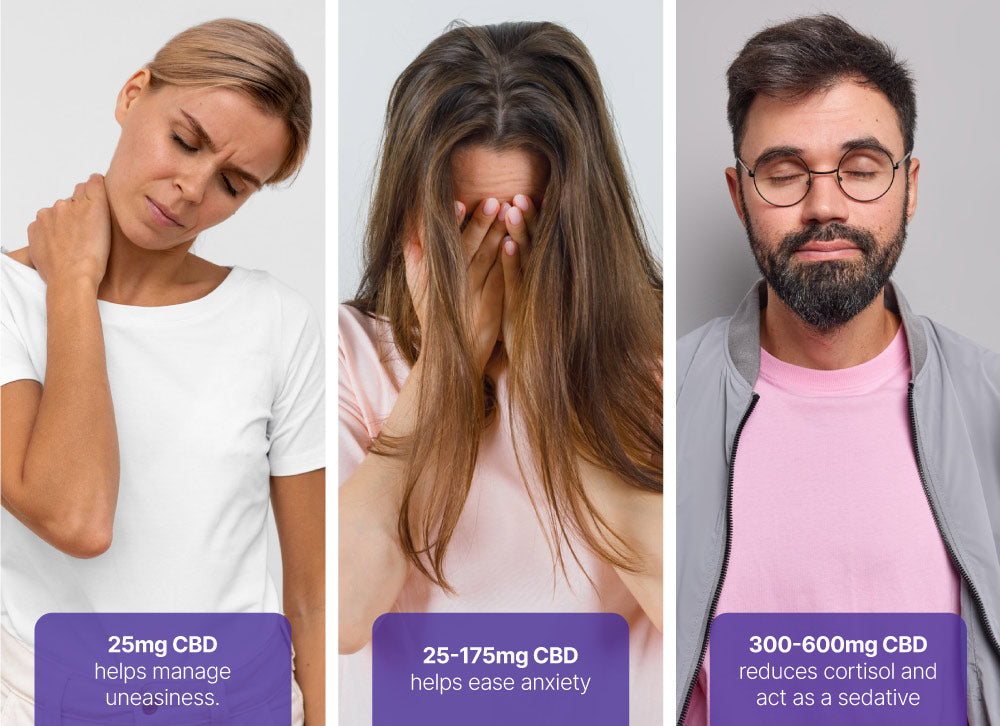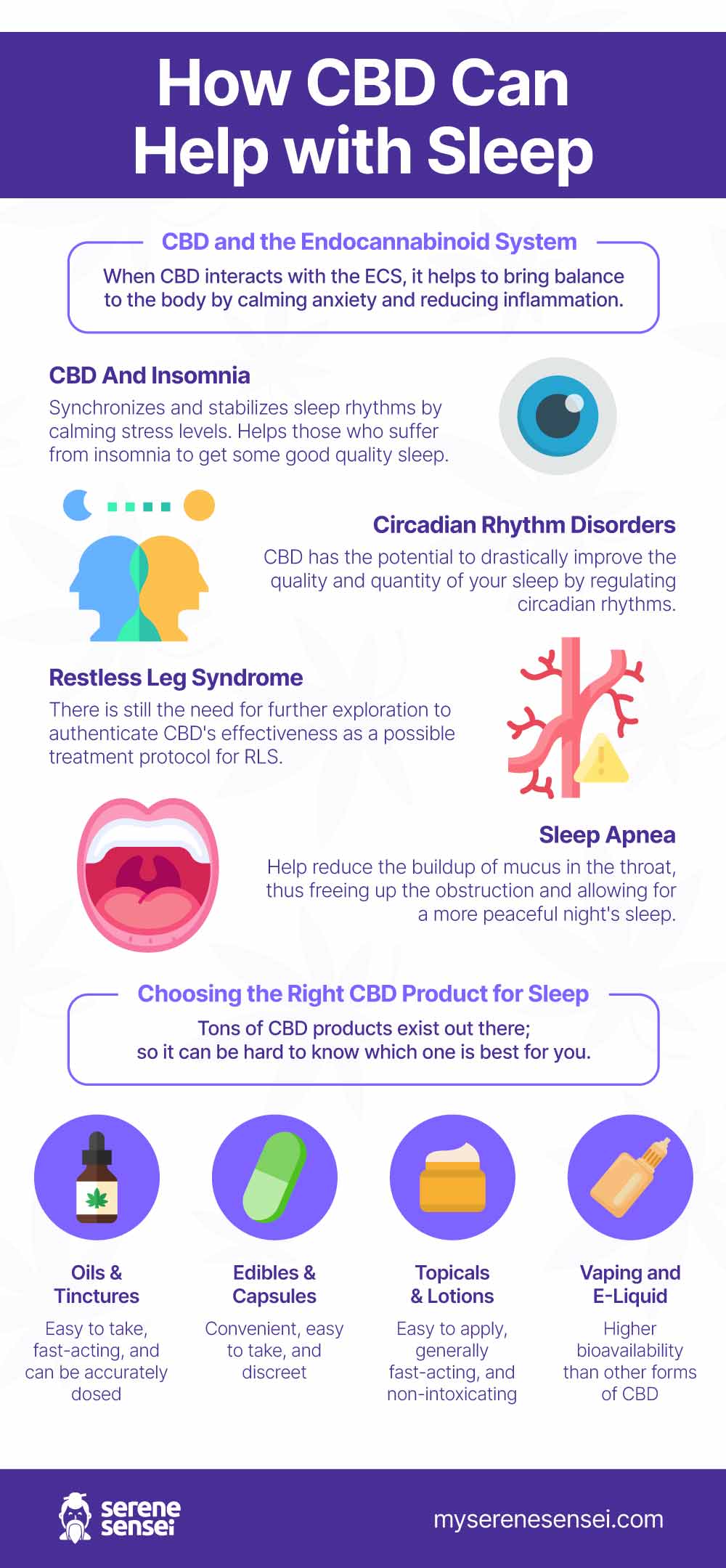Are you finding it harder and harder to get a restful night's sleep? Do you lie awake for hours, plagued by anxiety and racing thoughts? Many of us are all too familiar with the frustration that comes from not being able to drift off into blissful sleep. Fortunately, there is a natural solution: CBD. Using CBD for sleep can help reset your body's natural sleep rhythms and provide relief from the stresses of modern life.
CBD, or cannabidiol, is a naturally-occurring compound found in the hemp plant that has seen an explosion in popularity due to its wide range of health benefits. CBD has been known to reduce inflammation, alleviate chronic pain, and help with mental health issues such as anxiety and depression. It has also been found to be a potent sleep aid with virtually no side effects.
In this article, we'll explore the science behind CBD and how it can help you get a good night's sleep. We'll also provide some practical tips on using CBD for sleep so that you can start feeling more rested and refreshed in no time.
How CBD Can Help with Sleep
This section will discuss the science behind using CBD for sleep:
Understanding the Importance of Sleep
Sleep is a complex process that helps our bodies and minds rest, recover, and restore balance. During sleep, the brain cycles through multiple stages of activity, allowing the body to repair itself at a cellular level. A lack of quality sleep can have serious consequences on both physical and mental health.
Some of these consequences include the following:
- Poor concentration and memory
- Mood swings
- Low energy levels
- Weakened immune system
- Increased stress
- Weight gain
CBD and the Endocannabinoid System
The system responsible for regulating sleep is the endocannabinoid system (ECS). The ECS is a network of receptors that respond to naturally-occurring compounds known as cannabinoids, including CBD. It works with other parts of the brain such as the hypothalamus to control the body's sleep wake cycle.
When CBD interacts with the ECS, it helps to bring balance to the body by calming anxiety and reducing inflammation. This in turn can help you get a better night's sleep, as your body is able to relax.
CBD for Relaxation and Sleep Quality
As stated earlier, CBD binds with receptors in the brain that regulate fear responses, allowing your body to settle into its natural rhythms. This helps to reduce stress, relax the body, and promote a sense of calmness and peace. Below, we discuss how using CBD for sleep disruptors like anxiety, stress, and insomnia can help you get a good night's rest:
CBD And Insomnia
Insomnia is a very common issue that can interfere with your ability to fall and stay asleep. This lack of restorative sleep not only impacts how you feel emotionally and physically but also affects the way you perform at work and the satisfaction derived from everyday life. Insomnia can be a serious health concern if left unaddressed.
CBD's interaction with the hypothalamus has been proven to support and normalize overall sleep quality. This crucial component of our brain is involved in more than just temperature control; it also synchronizes and stabilizes sleep rhythms by calming stress levels – making it easier for those who suffer from insomnia to get some good quality sleep.
Research has shown CBD to be a more effective sleep aid than delta-9 THC, the primary psychoactive ingredient found in cannabis Sativa plants. Examining its impacts on those with insomnia and other sleeping disorders, researchers concluded that CBD proved far superior compared to the alternative substance.
Circadian Rhythm Disorders
The circadian rhythm is the body's natural clock which helps to regulate our sleep, wakefulness, and other bodily functions according to the Earth's 24-hour light/dark cycle. When this rhythm is disrupted, it can lead to a variety of conditions, such as delayed sleep phase disorder (DSPD).
CBD has the potential to drastically improve the quality and quantity of your sleep by regulating circadian rhythms. This is done via its action on cannabinoid receptors, which triggers a series that eventually leads to more regular sleep patterns in sync with day-night cycles. Those suffering from disorders relating to their internal clock may benefit especially from this effect of CBD!
If you work irregular hours, travel often, or just need help getting a good night's rest, CBD might be the natural solution you're looking for. One thing to note is that unlike CBD's effects on insomnia, which have been heavily studied, the effects on circadian rhythm disorders are still relatively unknown. As such, it's important to talk to your doctor before taking CBD for this purpose.
Restless Leg Syndrome
Although it sounds like a minor issue, restless legs syndrome (RLS) is a serious neurological disorder that can significantly impact sleep quality, symptoms include an irresistible urge to move the legs due to uncomfortable sensations, usually accompanied by cramps or tingling.
While the exact source of RLS remains unknown, it is believed to have a genetic component that can be passed down through families. Low iron levels in the brain and certain gene variants are often associated with this condition as well. This dysfunction may also stem from an issue in your brain's movement center.
Numerous early observations indicating a connection between CBD and enhanced symptoms of RLS have been based on patients' self-reported accounts, so there is still the need for further exploration to authenticate CBD's effectiveness as a possible treatment protocol for RLS.
Sleep Apnea
Using CBD for sleep apnea has shown to be a promising remedy. Sleep apnea is characterized by the interruption of one's breathing during sleep, usually due to obstruction in the throat. It can lead to fatigue and even heart conditions if left untreated.
We already know that CBD's anti-inflammatory effects can help reduce the buildup of mucus in the throat, thus freeing up the obstruction and allowing for a more peaceful night's sleep. This is key for those who suffer from sleep apnea as it can be a major cause of their restlessness and fatigue.

Choosing the Right CBD Product for Sleep
There are a lot of factors to consider when choosing the right CBD product for sleep. In this section, we will discuss what to look for when making your selection.
Types of CBD Products for Sleep Support
Tons of CBD products exist out there; so it can be hard to know which one is best for you. That's why we've created this guide! Here are some common forms of CBD that may help improve your quality of sleep:
- Oils & Tinctures
- Edibles & Capsules
- Topicals & Lotions
- Vaping and E-Liquid
These are further grouped into full-spectrum, broad-spectrum, and CBD isolate products. Full-spectrum contains all of the compounds found in hemp (including trace amounts of THC), while broad-spectrum has most of them except for THC. Isolate is pure CBD and does not contain any other cannabinoids or terpenes.
When selecting CBD for sleep support, it's important to consider your individual preferences and needs. For example, some people may find that edibles work best for them because they are easier to take and last longer. Others might prefer oils or tinctures so they can adjust their dosage more precisely.
It is also vital to consider other personal factors such as your lifestyle, budget, and dietary restrictions. For instance, if you are vegan or have allergies to certain ingredients, you may want to look for CBD products that are specifically labeled as "vegan-friendly" or "allergen-free."
Furthermore, if you don't like the taste of CBD, you may opt for edibles or capsules which don't have a strong taste. Similarly, if smoking or vaporizing is not your thing, you could go for topicals, lotions, and other non-smokable products.
To help you choose, here's a brief overview of the different types of CBD products:
Tinctures & Oils
Tinctures are basically liquid extracts that contain CBD and other cannabinoids. They are taken orally via a few drops under the tongue, which is why they're also known as sublingual products. Oils are similar to tinctures but are thicker in consistency and generally come in larger bottles with droppers for easy use. Using CBD oil for sleep can be a great way to get the benefits of CBD quickly and efficiently.
Pros:
- Tinctures and oils are easy to take, fast-acting, and can be accurately dosed.
- They are also one of the most potent forms of CBD available in terms of concentration.
Cons:
- The taste can be difficult for some people to get used to.
- Tinctures and oils don't last as long as other forms of CBD, so they may need to be taken more often.
Edibles & CBD Capsules for Sleep
Edibles are food or drink products that have been infused with CBD. They work quickly because they pass through your digestive system and can offer long-lasting effects. Meanwhile, capsules are simply pills that contain a predetermined amount of CBD in them.
Pros:
- Using CBD capsules for sleep is convenient, easy to take, and discreet.
- They offer a more accurate dose than tinctures or oils since the dosage is already pre-measured.
Cons:
- Edibles and capsules can be slow to work because they must pass through your digestive system before taking effect.
- Dosage may not be as customizable as other forms of CBD.
Topicals, Lotions, And Balms
Topicals, lotions, and balms are infused with CBD and applied directly to the skin. Using a CBD balm for sleep can help target localized areas of inflammation or discomfort and can help promote relief from soreness, tension, and other conditions.
Pros:
- Topicals and lotions are easy to apply, generally fast-acting, and non-intoxicating.
- They also offer targeted relief to specific areas of your body.
Cons:
- Topicals and lotions only work on localized areas and may not be suitable for whole-body relief.
- Topicals and lotions can take some time to absorb into the skin before taking effect.
Vaping & E-Liquids
Vaping and e-liquids are products that are specifically designed for use with vape pens or vaporizers. They offer a fast-acting form of CBD that gets absorbed quickly via inhalation.
Pros:
- Vaping and e-liquids are fast-acting, easy to dose, portable, and discreet.
- Vapes also provide higher bioavailability than other forms of CBD since they don't need to pass through your digestive system first.
Cons:
- There's a risk of lung irritation if you use the wrong type of vape juice or vape in an enclosed space.
No matter which form of CBD you choose, it's important to make sure that the product is lab-tested and contains only the highest-quality ingredients. This ensures that you're getting a safe, effective product that can help promote better sleep without any unwanted side effects.
What to Look for When Shopping for CBD Products
Here, we'll go over some of the most important factors to consider when looking for the best CBD for sleep:
1. Is It Lab-Tested?
One of the most important things to look for when shopping for the best CBD for sleep is whether or not it has been lab-tested. This ensures that you're getting a product that has been safely manufactured and is free from contaminants or toxins. It also helps ensure a more accurate dose and potency level.
2. Pricing
CBD products come in a wide range of prices, so it pays to shop around for the best deal. Quality is vital, but don't let yourself be taken advantage of by overpriced products that aren't any better than more affordable options.
3. CBD Concentration
When shopping for a product that's designed to help you sleep, it's vital to look at the concentration of CBD in the product. The higher the concentration, the more potent and effective the product will be. However, keep in mind that higher concentrations may also come with higher prices.
4. Brand Reputability
It's always a good idea to research the brand that makes the product you're considering. If they have a reliable reputation and are known for producing good quality products, then you can feel confident in your purchase. Check online reviews and other customers' experiences to make sure that you're getting the best product for your money.
Recommendations for Selecting a High-Quality, Trustworthy CBD Brand
Continuing from the previous section, selecting a high-quality brand is essential for finding effective CBD products. We recommend doing your research before making a purchase and looking for brands that have the following features:
- A commitment to transparent manufacturing processes
- Clear product labeling and information on ingredients
- Third-party lab testing and certification
- High-quality ingredients that are free from contaminants
- An overall commitment to customer satisfaction
Brands that tick these boxes are more likely to provide high-quality, trustworthy products that can help you get the most out of CBD for sleep.

When Is The Best Time to Take CBD for Sleep
Recommended Dosages and Timing for CBD Use
There are a lot of factors to consider when deciding when to take CBD for sleep. Generally speaking, the best time to take CBD for sleep is about an hour before going to bed, as this will give it time to take effect and help you drift off into a peaceful night's sleep.
It is recommended that you don't exceed 1500mg of CBD per day for sleep. Start with a low dose and gradually increase it until you find the one that works best for you.
It's also important to keep in mind that everyone's body is different and will respond differently to CBD. Therefore, it could take some trial and error to find the best time for your specific body chemistry.
Tips for Incorporating CBD into Your Bedtime Routine
Incorporating CBD into your pre-bedtime routine can be a great way to help promote better sleep. Here are some tips to get you started:
- Create a bedtime ritual that helps relax your mind and body. This could include taking a warm bath, reading a book, or meditating.
- Make sure to take your CBD about an hour before bedtime.
- Try to avoid caffeine and other stimulants near bedtime as they can disrupt sleep.
Consider using a CBD balm for sleep that can be applied topically and helps relax the muscles.
-
If using edibles, try to take them in the early evening to give them time to digest before bed.
- Consider switching up your CBD products occasionally, such as adding CBD oil or tincture if you normally use edibles.
Potential Side Effects and Precautions to Keep in Mind When Using CBD
Using CBD for sleep and calm doesn't come without effects, so it's important to be aware of all of them. Some of the effects include:
Fatigue: Fatigue is a common side effect of taking CBD. This can be avoided by taking it in the evening or before bedtime.
Dry Mouth: Taking CBD can cause dry mouth, so make sure to drink plenty of water after taking it.
Low Blood Pressure: People with already low blood pressure may experience an even lower reading when taking CBD, so it's important to be aware of this and take precautions if needed.
Interaction with Medications: CBD may interact with certain medications. Examples include certain antidepressants, antipsychotics, and other medications. Before starting any new supplement or medicine, always consult your doctor first.
Analysis of the Effectiveness of CBD for Promoting Sleep
Over the years, various studies have been conducted to assess the effectiveness of CBD in promoting sleep. The results vary by study, but generally, researchers have found that taking CBD can help people achieve better quality and longer duration of sleep.
A study on CBD's effects suggests that consuming either 300 mg or 600mg of CBD oil can markedly reduce cortisol levels and act as a sedative. Cortisol is the hormone responsible for stress-related symptoms, and it is generally at its peak in the morning. Unfortunately, those with insomnia often suffer from high cortisol levels during the evenings as well - leading to an increase in nighttime wakefulness.
Scientists recently conducted another study with 103 participants who experienced either anxiety or difficulty sleeping. Researchers tested the impacts of CBD in conjunction with other medical treatments and determined that a dosage ranging from 25–175 mg was best to ease anxiousness, while higher doses were necessary to achieve restful sleep. Surprisingly, they found that only 25mg proved most beneficial for managing uneasiness!
Both studies show that CBD could help improve sleep quality, reduce anxiety, and improve overall well-being. However, more research is still needed to understand the long-term effects of CBD use.

CBD and Sleep Disorders
Common Sleep Disorders and Their Symptoms
Below, we will extensively discuss various sleep disorders and their symptoms; however, we cannot diagnose any sleep issues. If you suspect you may be suffering from one of the listed disorders, please consult with a qualified medical professional:
• Insomnia
Insomnia is a sleep disorder that is characterized by difficulty falling and/or staying asleep. Symptoms include fatigue, irritability, difficulty concentrating, and feeling depressed or anxious.
• Sleep Apnea
Sleep apnea is a serious disorder in which breathing ceases during sleep. Symptoms include tiredness, snoring or gasping while asleep, headaches upon waking up, and disrupted sleep throughout the night.
• Restless Leg Syndrome (RLS)
Restless leg syndrome is a disorder that causes an urge or discomfort in the legs, which leads to an irresistible need to move them. Symptoms include tingling or itching sensations in the legs, throbbing or burning sensations, and difficulty falling asleep.
• Narcolepsy
Narcolepsy is a disorder characterized by excessive daytime sleepiness and sudden, uncontrollable episodes of falling asleep at inappropriate times. Symptoms can include severe fatigue, difficulty staying awake during the day, and vivid dream-like hallucinations upon waking up or going to sleep.
How To Manage Sleep Disorders
- Consult with a healthcare professional: Before taking CBD for any health issue, it is important to consult with a qualified healthcare practitioner or doctor who can provide guidance regarding the best dosage and product for your individual needs.
- Keep a Sleep Diary: Tracking sleep patterns and behaviors over time can help identify sleeping issues that may be related to an underlying disorder, such as insomnia or sleep apnea. Creating a log of how long you sleep each night, when you wake up, how often you wake up during the night, and general feelings throughout the day can help diagnose specific disorders more accurately.
- Consider lifestyle changes: Diet, exercise habits, stress levels, and other factors affect the overall quality of life – including getting enough restful sleep on a regular basis. Taking steps towards healthy living by engaging in physical activity regularly and eating nutritious meals can go hand-in-hand with using CBD oil to manage certain conditions like anxiety or insomnia that interfere with a good night's rest.
- Start slow: When starting out on CBD products - start low & go slow! Gradually increase the dosage until desired effects are achieved - this will allow one's body time to adjust safely and efficiently
- Monitor Responses: It is important to track the effects of CBD on one's sleep quality and adjust dosage accordingly. When taking CBD for sleep, it can be especially beneficial to note any changes in mood, stress, pain levels, energy levels, or other factors that may be related to an underlying condition like insomnia.
Frequently Asked Questions
CBD for Sleep Vs. Melatonin, Which Is Better?
CBD for sleep vs. melatonin, which is better? Well, CBD and melatonin are both effective for promoting sleep but have different effects. Melatonin helps the body transition into sleep by regulating the circadian rhythm, while CBD works to reduce stress levels and soothe any physical or mental discomfort that may be interfering with sleep. In many cases, taking the two together can produce better results than either one alone.
Is CBD OK To Take For Sleep?
Yes, taking CBD before bed can help promote a restful night and treat certain sleep disorders. However, it is important to talk to your doctor or healthcare provider before taking any supplements.
How Much CBD For Sleep Should I Take?
The amount of CBD needed to produce a restful sleep will vary depending on an individual's body weight, metabolism, and other factors. Generally speaking, taking a small dose of CBD once a day before bed should start to produce results fairly quickly.
Conclusion
CBD has gained popularity in recent years as a natural remedy for various health issues, including sleep disorders. Research has indicated that CBD could help to improve sleep quality and reduce both physical and psychological uneasiness.
Additionally, lifestyle changes such as regular exercise and healthy eating habits can be beneficial when taken together with CBD oil. Before taking CBD, it is important to consult with a healthcare professional and monitor one's responses for the best results.
We hope this article provided an informative insight into how CBD could provide relief for sleep issues. If you have any questions or would like to learn more, please contact us today. We look forward to helping you create a good night's rest!
Need Premium CBD Products?
Get more premium CBD products online on Serene Sensei. From CBD tinctures and CBD roll-ons to CBD for pets, all our products are third-party tested and made in the USA. Check out our products on our menu or contact our support team for any questions you may have.


